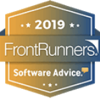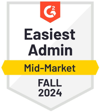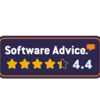What is HR Absence Management?
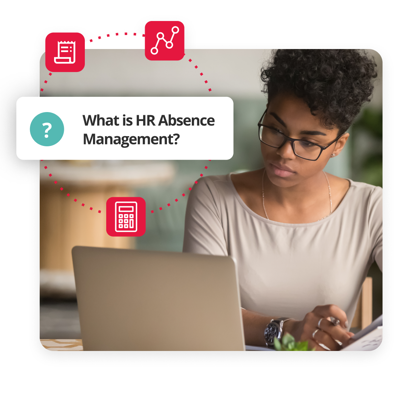
Effective absence management is crucial for project planning, shift scheduling and workload distribution, ensuring that the right people are in place to carry out essential tasks and meet deadlines. This supports overall organisational efficiency and also helps to maintain a positive working environment.
In this article, we’ll delve into what is absence management?, and its role within the broader context of HR processes. We’ll cover the fundamentals of absence management, explain how it benefits your business and employees, and provide insights into effective absence management strategies.
What is absence management in HR?
So, what is absence management in HR?
HR absence management refers to the processes and policies a company has in place to monitor employee absences, minimise absenteeism and optimise workplace efficiency. It involves recording absences, assessing their impact on the wider organisation, and putting a plan in place to maintain productivity when one or more workers isn’t present.
Effective absence management ensures that any absences, whether planned or unplanned, are handled efficiently to minimise disruptions and maintain operational continuity. As well as tracking who is absent, it also involves understanding the reasons behind these absences, providing deeper insights that can help managers and HR professionals to implement strategies to address them. When handled well, absence management policies can minimise absenteeism and maximise workplace productivity.

Why is HR absence management important?
Absence Management aims to balance employee needs with business requirements and is vital for maintaining a healthy and productive workforce. It helps organisations manage the challenges that come with employee absences and ensures that business processes run smoothly.
Some of the key benefits of HR absence management include:
- Reducing disruption to business operations
- Maintaining productivity and efficiency in the workplace
- Streamlining resource planning and scheduling
- Ensuring fair and consistent handling of absences
- Improving employee engagement
- Upholding compliance with legal requirements
- Supporting employees in their return to work
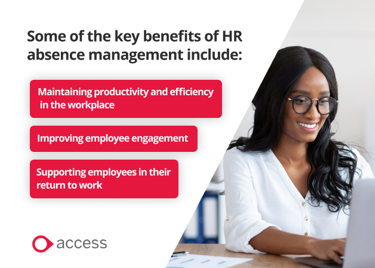
What is absence management policy?
An absence management policy is a documented set of guidelines that outlines how absences should be handled within an organisation. It defines the procedures for reporting absences, how many days of sick or compassionate leave employees are entitled to, and the procedure for effectively managing an employee’s return to work following an absence.
Organisations without a clear policy in place risk inconsistent handling of absences, which can lead to disputes, and lost productivity. Failing to clearly outline employee entitlements also makes it difficult to effectively track attendance, meaning that HR teams are less able to identify patterns of absenteeism that could signal deeper issues within the organisation.
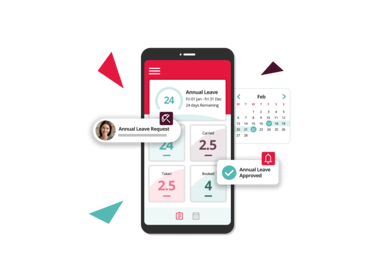
What should an absence management policy include?
An effective absence management policy is essential for creating a structured and fair approach to handling employee absences. To ensure clarity, consistency and efficiency, the policy should address several key areas, which should be regularly updated to ensure that they are in line with changing legislation and the evolving needs of your business.
1. The process for calling in sick
An HR absence management policy should specify a formal procedure for employees to follow when they need to call in sick. This might include identifying the specific person they need to contact, such as a line manager or team leader; providing notice within a certain timeframe; and whether any documentation is required, such as a doctor’s note.
Without this formal process, there can be confusion and delays in managing absences, leading to lost productivity or unfair treatment of workers. Employees may also be able to take advantage of lax procedures to gain additional paid time off that they’re not entitled to, which can be costly for your business.
2. The return-to-work process
A structured return-to-work process is essential for supporting employees’ transition back to work. This may include a return-to-work interview to discuss the absence and make any necessary adjustments to support their return to work. This procedure may not be necessary for all types or lengths of absences, and HR absence management policies should outline the circumstances in which the formal return-to-work procedure is required.
Businesses often overlook the importance of return-to-work interviews, which not only help to ensure that an employee is fit to return, but also presents an opportunity to address any ongoing concerns that could affect their performance or wellbeing. Without a specific process in place, employees may struggle to reintegrate, which can impact their health and the efficiency of the business.
3. How many paid sick days they receive
It’s important to clearly state the number of paid sick days employees are entitled to, and where this information can be found, which is usually in their employee handbook or employment contract. If employees exceed this limit, or if your organisation doesn’t have a company sick pay scheme in place, they will receive Statutory Sick Pay, which they’re eligible to receive for up to 28 weeks.
Not having this information officially documented can lead to misunderstandings and legal issues. Clear policies regarding the number of sick days an employee receives each year helps to ensure that they know their entitlements and can plan accordingly, reducing potential disputes. For insights into the impact of sick days across various industries, take a look at our 2024 sick leave report.
How to keep track of staff absences
Keeping track of staff absences is essential for maintaining smooth business operations and ensuring that workloads are managed effectively. It also allows HR professionals to gain deeper insights into employee engagement by identifying trends that could signify underlying issues within the organisation.
The most effective way to track and manage staff absences is through the use of absence management software. This technology simplifies the process by providing a centralised platform where all absence-related data can be recorded and accessed by relevant parties. By centralising this information, a cloud-based HR absence management solution enhances data accuracy and ensures that members of the leadership and management teams are aligned in how they handle absences.

Streamline Your Workforce with Absence Management Software
Absence management software is a tool designed to streamline the process of tracking and managing employee absences. It’s used by HR departments to keep accurate records and ensure compliance with policies.
Key features of absence management software include:
- Automated timesheets and absence tracking
- Rules-based WHAT for streamlined approval
- Integration with payroll systems
- Alerts and notifications for upcoming absences
- Tools to support return-to-work compliance
- Customisable absence reporting
- Analytics functions for monitoring trends
- Absence forecasting tools

Make HR absence management easy with PeopleHR
Effective HR absence management is crucial for a well-run organisation. It helps to minimise disruptions by efficiently handling absences, ensuring smooth business operations and maintaining productivity. It also helps to achieve compliance with legal and company policies while providing fair absence handling to boost employee satisfaction and increase efficiency.
PeopleHR offers an advanced absence management software solution designed to simplify and optimise absence management in HR.
From automated tracking and real-time reporting to a self-service portal and customisable policies, it offers exceptional functionality to meet the needs of your business. Its seamless integration with other HR systems also ensures consistent and accurate data throughout the organisation, minimising the risk of errors and supporting informed decision making.
For more information, or to see how our HR absence management solution can benefit your business, get in touch or request a free demo to see the software in action.
Related resources
We are trusted by experts

























